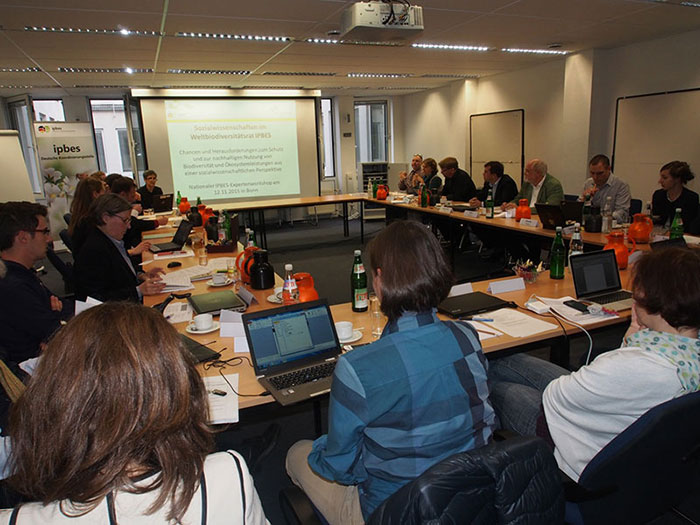Ergebnisse des nationalen Workshops zu Sozialwissenschaften im IPBES in Bonn, November 2015
Die Deutsche IPBES Koordinierungsstelle hat im November 2015 zu einem Austausch im Rahmen eines Expertenworkshops zu “Sozialwissenschaften im Weltbiodiversitätsrat IPBES - Chancen und Herausforderungen zum Schutz und zur nachhaltigen Nutzung von Biodiversität und Ökosystemleistungen aus einer sozialwissenschaftlichen Perspektive” nach Bonn eingeladen.
Um zu verstehen, warum die sozial- und geisteswissenschaftlichen Disziplinen in den vielfältigen IPBES Expertengruppen weniger stark vertreten sind als Naturwissenschaftlerinnen und Naturwissenschaftler, hat die Deutsche IPBES Koordinierungsstelle im November 2015 zu einem Austausch im Rahmen eines Expertenworkshops zu “Sozialwissenschaften im Weltbiodiversitätsrat IPBES - Chancen und Herausforderungen zum Schutz und zur nachhaltigen Nutzung von Biodiversität und Ökosystemleistungen aus einer sozialwissenschaftlichen Perspektive” nach Bonn eingeladen. Die Ergebnisse dieses Austauschs wurden in Form eines Policy Briefs von den beteiligten ExpertInnen aufbereitet und veröffentlicht.
IPBES strebt explizit danach, dass vielfältiges Wissens und damit auch viele verschiedene, wissenschaftliche Disziplinen eingebunden werden. Bisher sind Sozial- und Geisteswissenschaftlerinnen und -wissenschaftler aber in den IPBES-Expertengruppen und -Gremien zum Teil deutlich unterrepräsentiert. Um zu verstehen warum die sozial- und geisteswissenschaftlichen Disziplinen in den diversen IPBES-Expertengruppen weniger stark vertreten sind als Naturwissenschaftler, hat die Deutsche IPBES-Koordinierungsstelle zunächst im November 2015 zu einem Austausch im Rahmen eines Expertenworkshop zur Rolle der Sozial- und Geisteswissenschaften in IPBES eingeladen. Als Ergebnis der dortigen Diskussionen und weiterer, nachfolgender Austausche wurde ein Policy Brief mit konkreten Vorschlägen zur Stärkung der Sozial- und Geisteswissenschaften innerhalb von IPBES sowie eine kurze Korrespondenz im Fachmagazin “Nature” von den beteiligten Wissenschaftlern veröffentlicht.
Da die Ergebnisse des Workshops dem internationalen Publikum zugängig sein sollen, erfolgt die Darstellung der Ergebnisse auf Englisch.
Outcomes of the Workshop:
Social sciences and humanities in the Intergovernmental Platform on Biodiversity and Ecosystem Services (IPBES)
Chances und Challenges for the protection and the sustainable
use of biodiversity and ecosystem services – from a social sciences and humanities perspective
(12 November 2015, Bonn / Germany)
The recently established Intergovernmental Science-Policy Platform on Biodiversity and Ecosystem Services (IPBES) aims at providing a mechanism to synthesize, review, assess and critically evaluate relevant information and knowledge generated worldwide on the status of and trends in biodiversity and ecosystem services.
The establishment of the IPBES was strongly supported by the scientific communities and understood by the international policy communities as a response to the dramatic biodiversity loss. Since the beginning of the debate on establishing a global science-policy interface, international scientific and policy communities have been searching for a common institutional and knowledge framework for strengthening the knowledge base of global biodiversity policy and politics.
The role of natural scientists is quite obvious in the IPBES process: they have proven to be (pro-)active contributors to global assessments and related policy debates. By contrast scholars from the social sciences and humanities remain a minority, even though their role in identifying the barriers for policy implementation and the sustainable use of natural resources is generally recognized.
Expert workshop to discuss the role of social sciences in humanities:
To identify and assess reasons for the prevailing low representation of experts from the social sciences and humanities in the very early stage of the IPBES process, the German IPBES Coordination Office was requested by the Federal Ministries for the Environment, Nature Conservation, Building and Nuclear Safety (BMUB) and Education and Research (BMBF) to organize an expert workshop on this issue.
The German IPBES Coordination Office invited experts from the fields of social sciences and humanities, the IPBES secretariat, IPCC experts and ministerial representatives to attend a one-day expert meeting on 12 November 2015 in Bonn, Germany, titled “Social scientists in the Intergovernmental Platform on Biodiversity and Ecosystem Services (IPBES). Chances und Challenges for the protection and the sustainable use of biodiversity and ecosystem services – from a social sciences perspective” (“Sozialwissenschaften im Weltbiodiversitätsrat IPBES. Chancen und Herausforderungen zum Schutz und zur nachhaltigen Nutzung von Biodiversität und Ökosystemleistungen aus einer sozialwissenschaftlichen Perspektive”).
Discussions at the workshop were based on a background paper available in German and a series of impulse statements covering issues ranging from the disciplinary representation in IPBES assessments to the composition of the IPCC. The following presentations held at the workshop are available for download (see Box on the right).
Results – A policy brief and a brief correspondence in the science magazine „Nature“:
Recommendations and associated policy options emerging from the one-day multidisciplinary expert meeting in Bonn were formulated by the experts in a policy-relevant format and contain practical measures to overcome the identified low representation of experts from the fields of social sciences and humanities in IPBES assessment and review processes.
The document was made available for discussions at the IPBES stakeholder days, which took place from 20 to 21 February 2016 in Kuala Lumpur, Malaysia available at the subsequent fourth Plenary of the IPBES, held from 22 to 28 February 2016 in Kuala Lumpur as well. The deliberations and outcomes of IPBES-4 will be used as an opportunity to rethink the role of social sciences and humanities and their scientific communities in biodiversity politics and science.
The document has been backed by the publication of a brief correspondence in NATURE, which is based on the discussions of the workshop in Bonn and which was made available online shortly before the start of IPBES-4 with the aim to raise awareness on existing disciplinary gaps in IPBES and on the need to support existing and new initiatives to close them.
(German IPBES Coordination Office, Bonn, 16.02.2016)
 Susanne Lehmann / DLR
Susanne Lehmann / DLR




